Glenncáenna, Galloway, Scotland
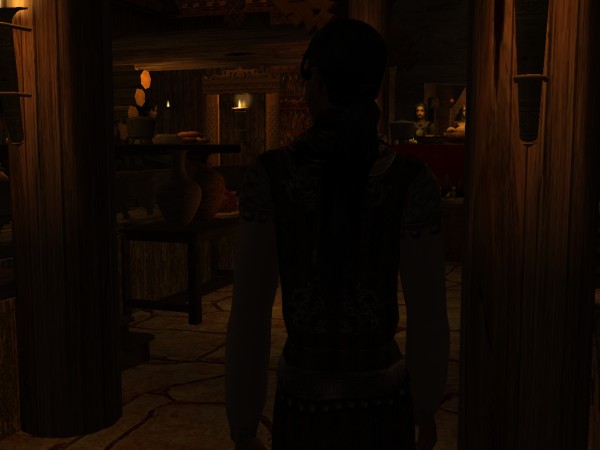
Eochaid let the door swing shut beneath its own weight and a breath of wind. He came bearing his own thunder: he did not need to enter with a bang.
He waited in the twilit entry until he had caught the eye of mac Cuan, seated at the end of the hall. He stared through a golden haze of smoke, seeing his own might almost embodied: an invisible hand lifting the older man from his chair by the collar.
Once on his feet, mac Cuan cracked his heel down on the hollow floor and shouted, “Eochaid mac Aeda, Lord of the Colins!”
The rippling conversation of the hall went silent, and Eochaid stepped forth before the wondering murmurs could begin.
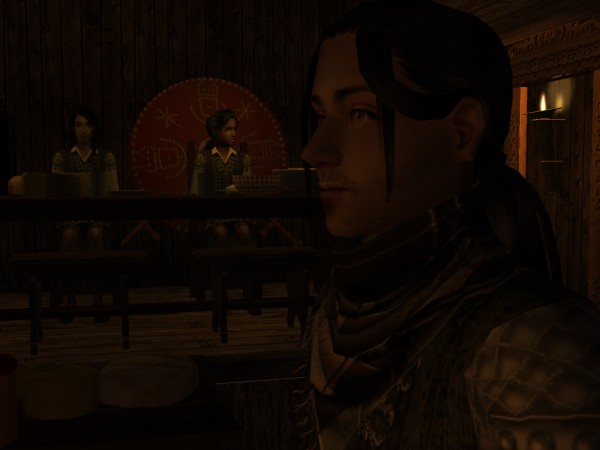
He had never been so tall in his life. He was lighter and lither, almost crackling with lightning. The loosened buckles of his sword belt rang like fairy bells upon his hips, making the heads of all the ladies turn. Every gritty, scraping step of his boots was answered by a low rumbling like thunder, as every man he passed pushed back his chair and stood in his honor.
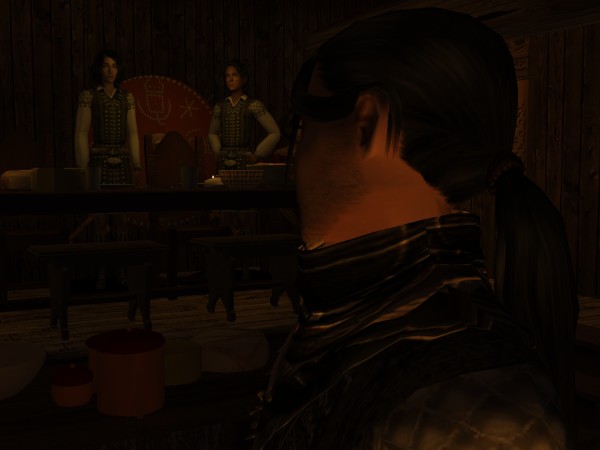
Mac Cuan, Cualann, Mael Mithig, Mael Coluim the Moor. Aed’s son Comgeall took his time wiping his mouth, but he rose. Aed’s uncle Fingin made haste with his old bones.
Every man stood as Eochaid went by, but he could only walk so far. At the high table Donnchad and mac Donnchada only watched him come, immobile as spare Aeds. Cathal made him no more honor than sitting forward and looking attentive. And Lord Lulach seemed more interested in Uallach’s reaction than in Eochaid himself—as though he were not a married man!
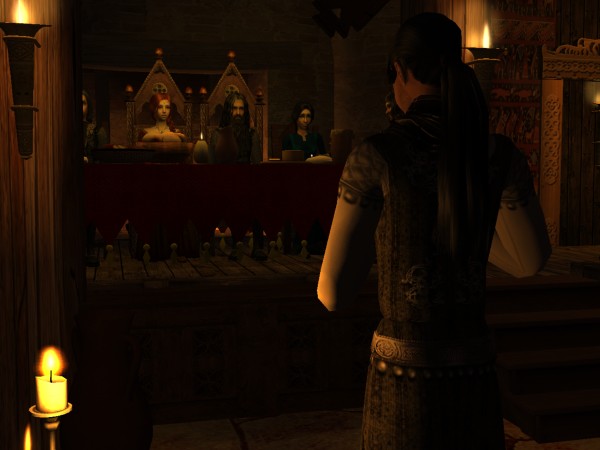
Eochaid swore they would all be on their feet before the hour tolled—even unto Old Aed, stepping down from his dais to congratulate him.
Still, after a last glance around the hall, he admitted himself relieved to see that one man in particular was not in attendance tonight—the one man whose reaction he feared. Aed of the Aenguses would never have stood, unless it were to pick up his chair and hurl it at Eochaid’s head in outrage. Young Aed could rarely be found in this hall, it was true, but inviting him just in time to meet Eochaid would have been very like Old Aed.
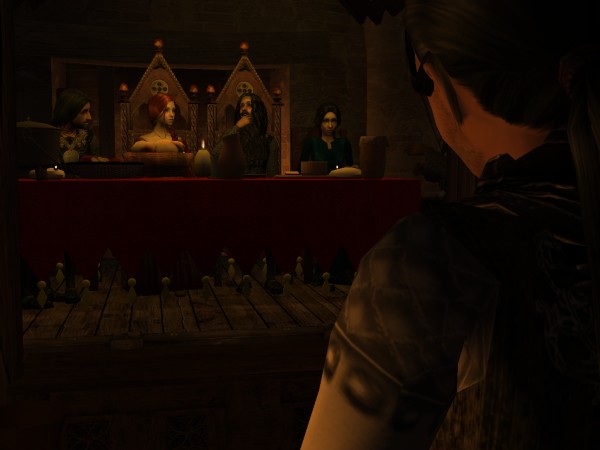
Tonight, however, Lord Aed seemed to be in a remarkably jovial mood, for he stroked his beard and boomed, “Eochaid! How are you, lad? We were just sitting down to supper.” He stretched out his arm towards one of the tables and said, “Aibinn, dear, would you kindly… no, boy—”
Eochaid wailed, “Wait!”
The men that had been pulling back their chairs stopped again. Aed withdrew his arm. After a moment’s reflection he added the further gesture of frowning with his brows.
But surely, Eochaid thought, surely Aed did not intend to send him—a lord—to sit above no more important a personage than Comgeall’s wife? Or even below Comgeall’s wife? Was Aed so certain he had been defeated?
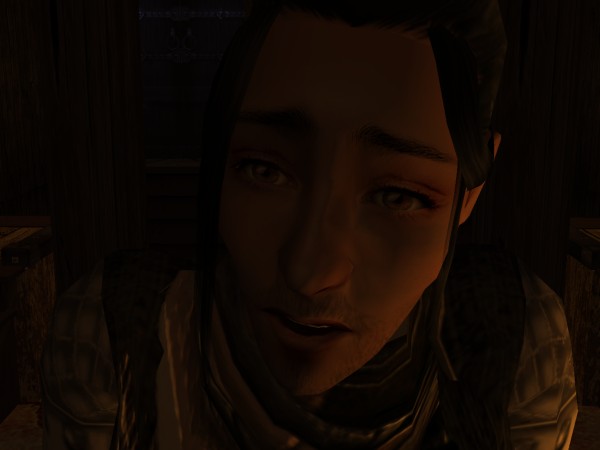
“Won’t you listen to the news I have to tell?” Eochaid demanded.
Aed scratched his beard and stared down at his daughter out of one eye, as if looking for his response in her. Eochaid watched her closely with both. The merest sign, the slightest smile of encouragement…
Finally Aed shrugged and said, “We’re listening, lad.”
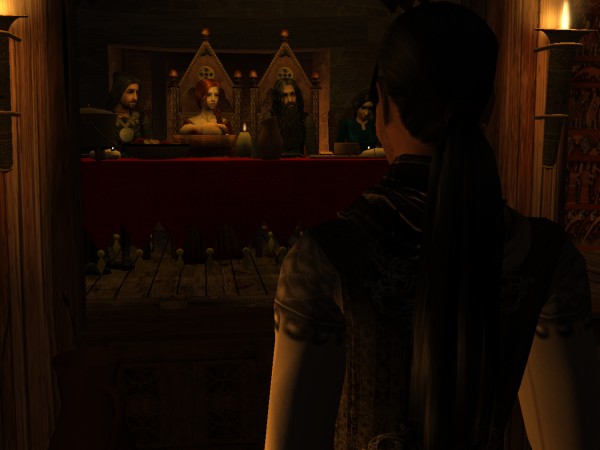
Eochaid brought his heels together and straightened his back, startled to find himself slouching. Somehow, in the confusion of his entry, his first fistfuls of thunderbolts seemed to have wilted in his hands.
He took a deep breath and waited until the men had returned to their chairs, and waited a moment longer: just until the crowd’s curiosity and impatience began to crackle in the smoky air.
“My lord!” Eochaid banged his wrist against his breast in a lord’s salute. “We have taken Ramsaa!”
Heads turned right and left. Only Aed and Eochaid stared straight ahead, each at the other. Donnchad leaned forward to look past Orlaith at Aed. Mac Donnchada leaned past his father.
And Uallach, Uallach… Eochaid dared not look, but was she peeping up at him? Her eyes were so dim!
At last Old Aed moved: a slight stirring of the beard beneath his chin as he clenched and unclenched his jaw. “We?”
Eochaid nodded stiffly. Of course.
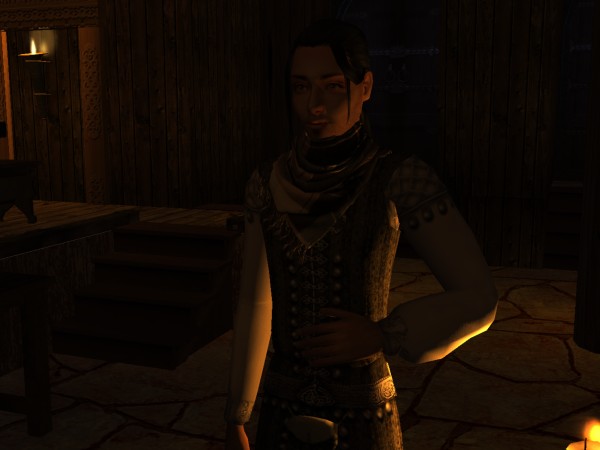
“Diarmait and I,” he corrected, shrewdly putting the old lord’s son before himself.
Orlaith gasped and laid a hand upon her throat. Heads that had only turned now bent to other heads and whispered. At last Uallach looked up at him truly, her dim eyes so wide with shock or surprise that they appeared brightly blue.
Eochaid stood tall and let them whisper and wonder around him. Chairs creaked like old boughs in a wind, and ladies’ gowns rustled like leaves. He was the rising storm.
In the midst of all his majesty, however, Eochaid let himself be distracted by the scrap of color that had been flapping just at the edge of his sight all this time.
Ben Muman! He had not seen her behind the bread basket. The little girl’s face lit up at his first glance, and she waved eagerly at him over her plate. Eochaid hurriedly looked back at the high table and pretended not to see.
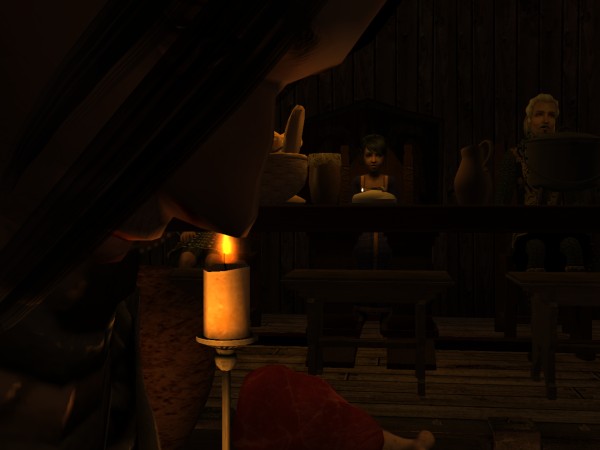
Ben Muman! In the wedding train Eochaid had been obliged to ride all the way to Three Winds with the abominable little creature perched on his saddle before him: fidgeting the entire time, craning her head around to inform Eochaid of her every thought and ask him her every question, and calling out to the laughing men on either side of them to ensure that everyone witnessed her glorious ride.
Eochaid had never seen a nine-year-old girl in Aed’s hall before. Inviting her tonight was very much like Old Aed.
Eochaid had nearly forgotten what had brought him to the hall in the first place when he heard Comgeall’s wife call out slyly, “Who’s Ramsaa? And more importantly, how many brothers is she having?”
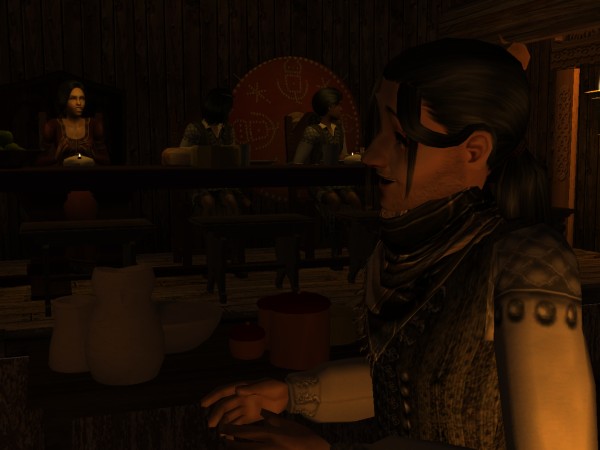
Everyone on either side of the hall laughed—even the abominable little creature, though she could not have understood the joke. But the men and ladies at the high table scarcely smiled, and the expression of Aed’s mouth was lost in the blackness of his beard.
“Ramsaa’s a place, not a person, darling,” Eochaid explained to the woman. “Just across the waters on the Isle of Man.”
Aibinn sat back and snorted, apparently already in possession of this knowledge and annoyed to be corrected. Comgeall laughed a little louder.
Meanwhile Uallach was trying to catch the eye of her mother, while Donnchad was nearly pressing Orlaith against Aed’s shoulder in his attempts to lean close to Aed’s ear. Matters were getting out of hand.
“My lord,” Eochaid asked, trying to keep his voice light, “weren’t you telling them of your plans?”
Aed opened out his arms like Moses over the sea and pushed his wife and children back into their seats. The sounds of laughter and the restless shifting of bodies rolled away before him in waves.
“No.” With one word Aed’s voice filled the silent hall from end to end. “Why don’t you tell them, lad?”
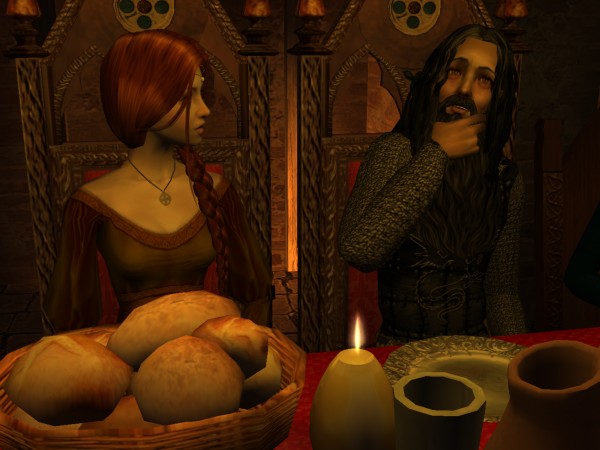
Aed sat back. His old chair creaked and popped like a burning log, and the fire in the great hearth behind him glowered through its arches like a glimpse through the gates of Hell. Eochaid had nothing but excellent news to tell, and still he felt as if he were about to plead for his life.
“I shall try!” he cried, trying to make his voice thunder through the rafters like the old lord’s. “But it is a tale for bards to tell: How Ramsaa was taken in the winter by the sons of two Aeds!”
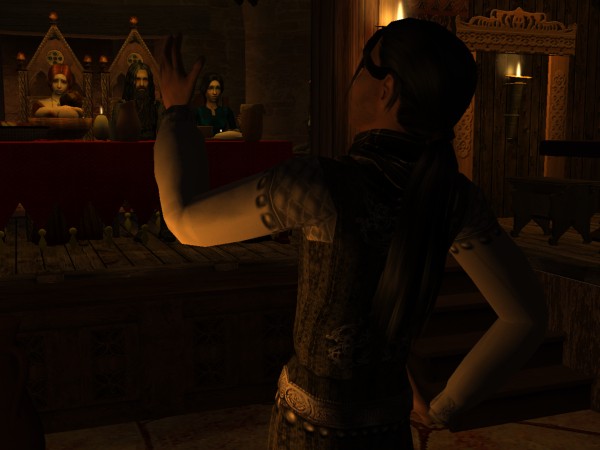
This lofty introduction went over better than he had expected. Orlaith still fingered her silver cross, and Lord Lulach did his best to look bored, but every pair of ears was intent on every word Eochaid had to say. Even the wind seemed to hold its breath in the eaves.
“How, on the Feast day of Flannan, the men of Ramsaa looked out onto the eastern sea, and saw coming out of the mist the black sails of the sons of Colin—straight unto the city they saw coming the men of Aed!”
Uallach leaned forward then and unconsciously smiled, turning full on Eochaid the dim, dreamy eyes of a girl listening to a tale-teller truly. Eochaid swore he would not fail her: he was telling her the living history of her clan. He was telling her the adventures of the young hero who might one day be her man.
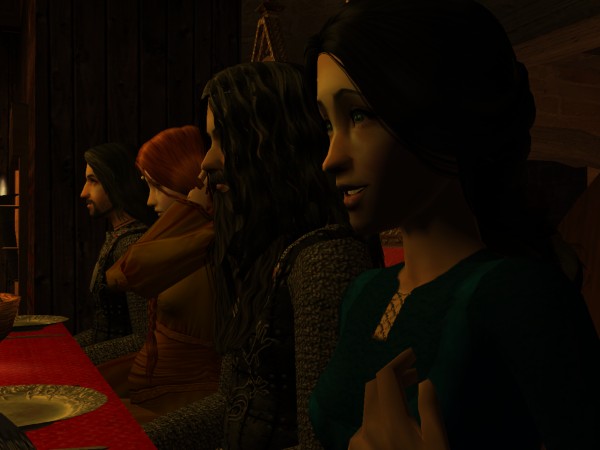
“And how they then looked out to the north and saw the yellow flags flying from many masts, and the flame-red prow of Iron Bear, and the blue-painted sail of the Star of the Sea!”
Eochaid stopped, shaken, as a sound like pattering hail rolled through the hall: the slight cracks and scrapes of bodies shifting in chairs, the tinkle of buckles, the whispers here and there: Eir-rakki to the men who knew a little Norse, Cu Chreduma to the Gaels.
Comgeall and Cathal leaned forward with more than attentiveness, and many dark eyebrows descended over many eyes. But this was only the start of his story, Eochaid reminded himself, and as soon as he spoke again the hall fell silent but for a faint tap-tap-tap like water dripping after a rain.
“And how, as the tide went out of the river, the men of Ramsaa took to their ships and sailed up the coast—for the light ships of Brass Dog could scarcely do battle on the water, they said, and if they could be kept from landing they might be tossed to pieces on the sea!”
What was that tapping? As he took a breath Eochaid glanced around the hall in search of a knife hilt being knocked impatiently against a table, or something equally menacing… but no, Young Aed was definitely not there.
“And the slow, deep-drafting warships of Lord Aed in the east were no danger, said the men of Ramsaa, for never could they be entering the river at low tide!”
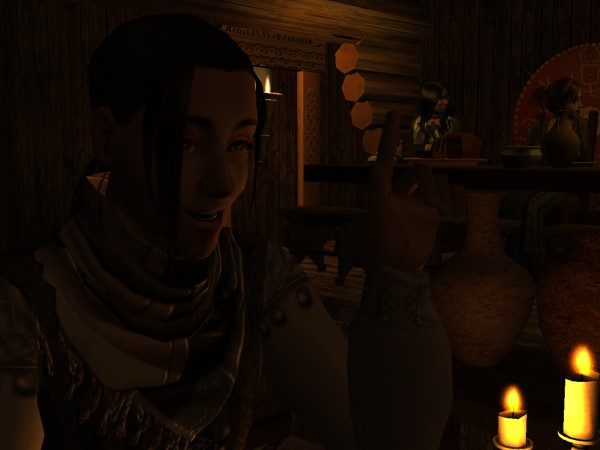
The tapping abruptly stopped. Eochaid realized then that it had been Ben Muman kicking the leg of her chair, for just as abruptly the little creature piped up with, “Our ships are not slow!”
Her grandfather laid a hand on the top of her head and shushed her. Some of the ladies giggled, and Comgeall’s wife called softly across the hall, “That’s telling him, girlie!” But Uallach only licked her lips and waited eagerly—she knew Eochaid was only getting to the best part of the tale.
“And how as they advanced through the mist, the men of Ramsaa,” Eochaid continued, speaking now to Uallach alone, “like men waking from fairy dreams they found that the rust-colored figurehead of Iron Bear was no more than a woman’s orange gown tied to the prow of Steed of Mo-Chotha—that the yellow flags were no more than rags of dyed wool—and that the particolored sails of Brass Dog’s fleet hung from the masts of the slow, deep-drafting, heavily-armed warships of Lord Aed!”
Eochaid thought it an opportune moment to pause. Uallach shoved her plate and cup forward to make room for her to lean her arms across the table, and by the time her dim eyes met his eyes again, her lips were parted, her teeth were parted, and she was visibly breathless.
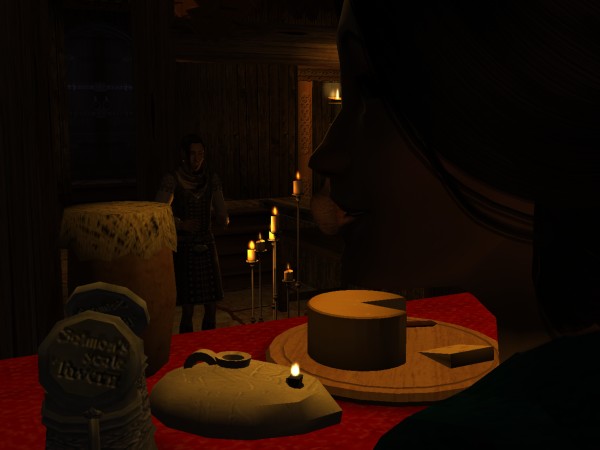
Oh, if Aed would only lift his arm again and say, “Lulach, will you kindly move down…” If Eochaid could only sit through supper at her side, and regale her with all the details… near enough for her to smell the salt of the sea still in his hair, and to see the rope-burns on his palms, and the deep cuts on his knuckles… perhaps even to coo over them and touch them soothingly with her fingertips as girls liked to do…
“You tricked them!” Ben Muman gasped.
Eochaid shook his head like a man waking from a fairy dream.
Before Fingin could shush the little creature, the Moor begged, “What happened with Brass Dog’s ships then?”
Nobody shushed the Moor. Eochaid felt the tide turning. They were all with him. He thought that if he left and entered again, Cathal would rise.
He went on, refreshed as if he had just taken a drink of cool ale.
“And the bards shall tell!” he cried. “How, as the Gaels fought ship-to-ship with the Norsemen of Ramsaa, and won them or chased them off like yelping dogs—meanwhile the light, shallow-drafting ships of Brass Dog did cross unmolested over the bar at low tide: straight into Ramsaa, under the black sails of Aed!”
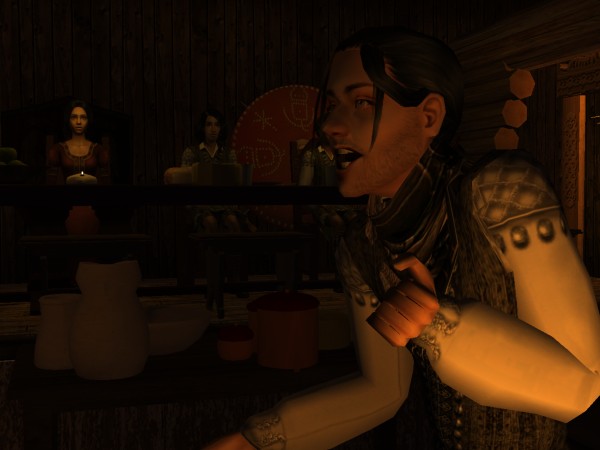
Eochaid paused for breath, giving Ben Muman the opportunity to laugh in wicked delight. Eochaid was briefly annoyed, but the little girl’s audacity seemed to free the others into chuckling along with her, or at least sitting up and nodding at one another over this remarkable tale. They were all with him, lifted like leaves before the wind of his storm.
“And they shall tell! How Earl Eirik’s men valiantly held the harbor until the sea began to rise! And they shall tell how the men of Aed landed in the town by the light of the setting sun! And they shall tell how, at the terrible sight of them, all red with the blood of their brothers, the Norsemen fled—the Norsemen of Ramsaa and the Norsemen of Saint Brendan’s alike!”
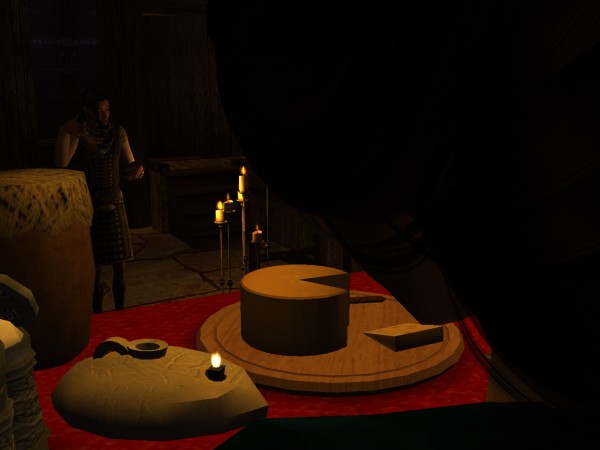
With glory after glory Eochaid’s voice pealed among the rafters like wild thunder in the heavens. Uallach clasped her hands before her mouth in breathless excitement.
“And they shall tell! How all the people of Ramsaa—man and maid and child—all came to the harbor, and knelt them down before Diarmait son of Aed, and praised God, who had delivered them: Gaels unto Gaels! Gaels over the Island forever!”
His words echoed briefly and fell off into a startling silence, unbroken even by the tap-tapping of falling water or the shoes of restless little girls. Eochaid stood stunned, at the end of his tale, wondering what he had unleashed.
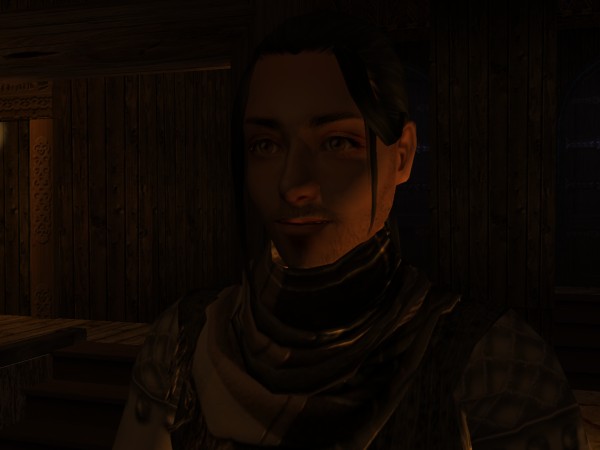
And then he heard it: a low rumble like distant thunder—chairs scraping across the hollow floor, and mugs sliding across table tops, and men and ladies murmuring to each other as they all prepared to stand up together, to lift their cups and cry out in praise and victory like the Gaels of Ramsaa.
It was glorious. Eochaid had won. He had done what Young Aed had not yet had the balls to try. He even deigned turn an indulgent eye to Ben Muman, squirming gleefully on her chair at his side. She was already on her knees and ready to leap up like the others, to stand at woman’s height and drink to Eochaid’s victory with her cup of milk. They all awaited only a signal from Aed.
But Aed rumbled, “Who ordered this done?”
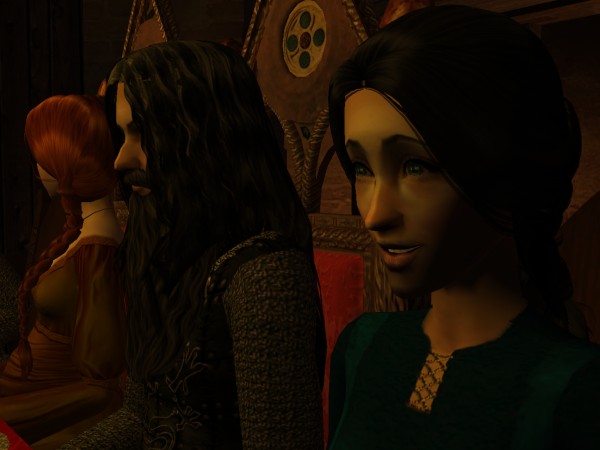
Eochaid opened his arms to pronounce another grand phrase, but as he realized what he was saying, it came out in a squeak.
“You did, my lord.”
“I have not seen you since the first snows fell,” Aed scowled.
He paused to sweep plates and knives and cups aside as if he feared they would become dangerous projectiles in the blast he was about to make.
Eochaid began, “But you see…”
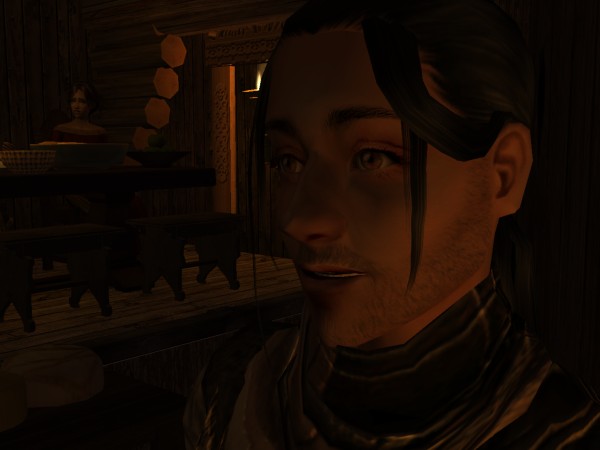
“Who ordered my ships onto the open sea in the winter?” Aed thundered. “Who ordered Brass Dog to be allowed to strip them of their sails? Who ordered them dressed up like painted harlots and adorned with rags? And who—who ordered my men to bathe in the blood of Norsemen while surrounded by a sea of water? Who ordered this in my name?”
Eochaid swallowed, but his throat seemed pasted shut from top to bottom. “I thought you did, my lord…”
“Who told you I did?” Aed demanded.
“Diarmait did, my lord.”
“Diarmait did? Diarmait said I did?”
His wife and daughter were wan as snuffed candles on either side of him. Donnchad nervously rubbed his hands together as if trying to wash them clean.
“I’m not remembering,” Eochaid mumbled. “What he said exactly. I simply did not doubt that Diarmait would not act in any way contrary to your orders, my lord.”
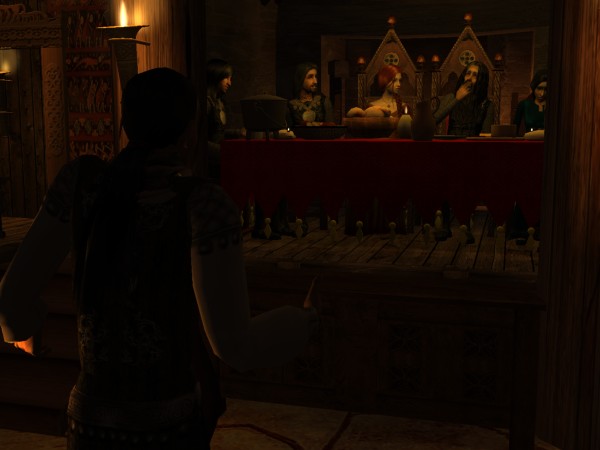
“You believed everything he said?”
“Aye, my lord,” Eochaid admitted, hoping to have found a means by which he might escape the blame.
Aed snorted into his beard and sat back in his chair. As soon as his shoulders touched the wood, Orlaith leaned forward and asked, “Where is Diarmait now?”
“Diarmait is at Ramsaa, my lady,” Eochaid bowed. “The people want him as lord there. I believe he means to stay.”
“Where are my ships?” Aed snapped.
“They’re most of them still at Ramsaa,” Eochaid said. “I brought Steed of Mo-Chotha and Bright Swan home with me—”
“What are they wearing?” Aed demanded. “A strumpet’s rags? Do you still have a woman’s orange gown tied to the prow of one of my best ships?”
“No, my lord…”
“And their sails?”
“Ah… we hadn’t had the chance to swap them back with Brass Dog again by the time I left…”
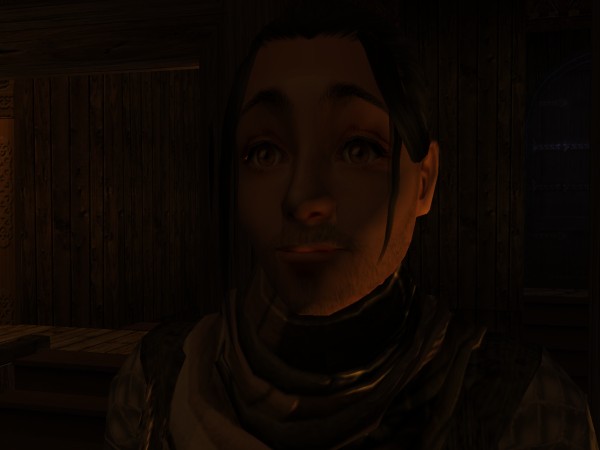
Aed sat back and slammed his fist down on the table, clattering all the cutlery and crockery he had wisely pushed aside.
Donnchad asked, “So you are saying there is now a small fleet of pirates on the Irish sea under our sails?”
“Brass Dog does mean to give them back…” Eochaid said.
“Aye, then Brass Dog can bring them back to Scotland!” Aed said. “Bring those ships home, Eochaid. And when he brings you the sails, send him to me!”
Aed snorted and wiped his hand from his forehead down to the tip of his beard in conclusion of the discussion. Uallach looked fearfully at him, at her mother, and finally, pleadingly at Eochaid.
“But wait!” Eochaid cried. “What about Diarmait? You cannot be leaving him a sea-fort without any ships!”
“I left him neither sea-fort nor ships,” Aed grumbled. “It is no fault of mine if he now has one without the other.”
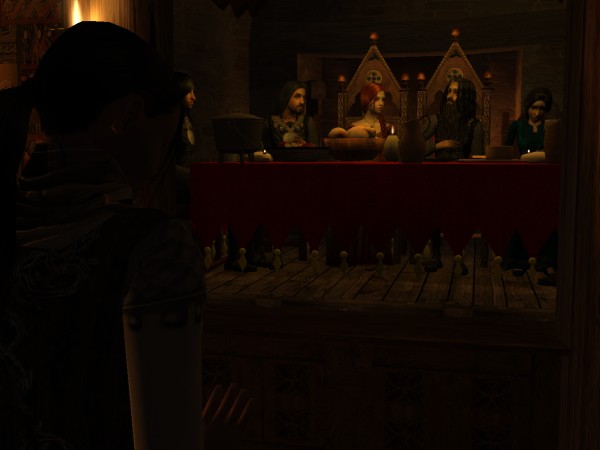
He raised his arm to point at one of the tables, but Uallach pushed it down again and clung to his sleeve. “You cannot, Father!” she begged softly.
Eochaid had been annoyed to see Diarmait welcomed as a hero by the people of the town while he—a lord—provider of the ships—had been overlooked. He had told himself it was the difference in their ages, or the ranks of their fathers, or perhaps simply that Diarmait had captained the pseudo–Star of the Sea and had been the first man real-Eirik had pulled down onto the dock beside him.
Now, of course, Eochaid was rather relieved it had not been he, but he could not leave his new friend and companion to the mercies of Whitehand and the straggling survivors of the sea battle. He could not leave him defenseless before whatever Brass Dog had planned, for Eochaid had found it worrisome and strange that Eirik would flee with all hands from a victory, quite as though it had been a defeat. And, of course, he could not leave Diarmait to be undone by Young Aed.
“He needs help!” Eochaid pleaded.
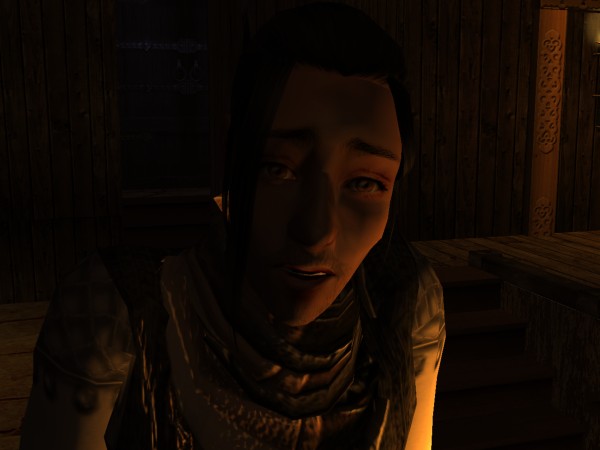
“Please, Father,” Uallach whimpered. “Help him. He is my brother.”
Aed grunted and subtly extracted his sleeve from her grasp while pretending to pat her hand. He turned to Orlaith and asked, “What say you, Mother?”
Orlaith tilted her head slowly to one side as though listening for a command from on high. Then she lifted an elbow towards her stepson. Donnchad immediately slid back his chair and stood to help her rise.
There came another rumbling like thunder from every side. Every man but Aed pushed back his chair and stood without hesitation—even Cathal and Lord Lulach and mac Donnchada. Fingin’s old bones proved more spry than Eochaid had first believed.
Alone among the smoke and gloom, alone among the swarthy, dark-kilted sons of Colin the Black, the great lady was all glowing gold, like the living goddess of an Irish legend. She raised her hands for silence, though no one dreamt of saying a word. Even Ben Muman was still.
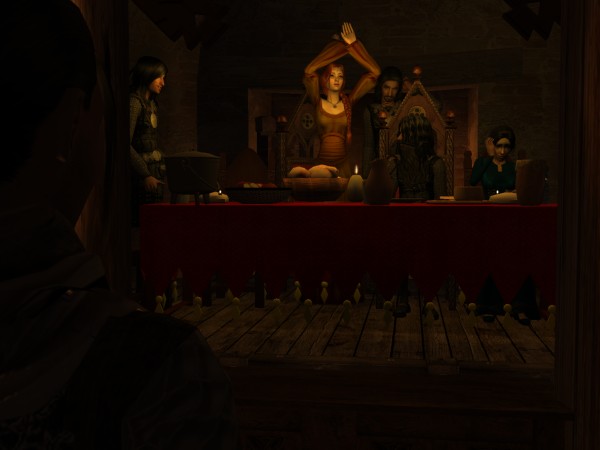
“‘And the Lord God said, it is not good that the man should be alone; I will make him an help meet for him. Therefore shall a man leave his father and his mother, and shall cleave unto his wife: and they shall be one flesh.’”
She dropped her arms and stared out into the hall, as though the command she was about to give applied to every man, and not only the man who had asked her.
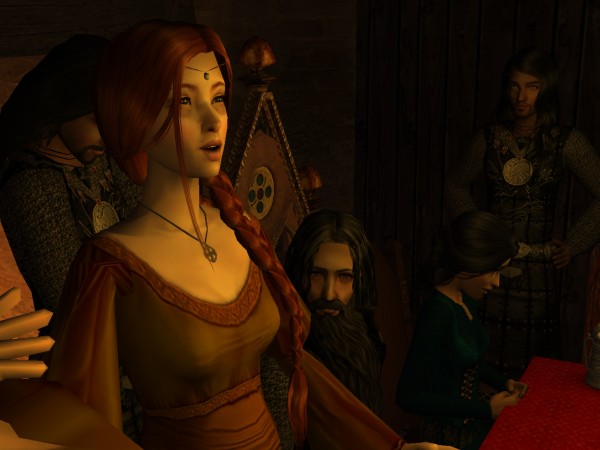
“Send for Sadb his wife to be help meet to him. She shall sail to Ramsaa and bear my father’s drinking horn to him. Diarmait is the son of Scotland and Ireland, and Sadb is the daughter of the Southern Isles. Their son shall be the son of Man, and when the bards sing his tale, they shall begin with this line: How, on the Feast day of Saint Flannan, in the year of Our Lord one thousand eighty-five, Diarmait mac Aeda struck the first blow in the battle that would win back to the Gaels the lands of the Gaels, forever.”
Here and there the wooden floor creaked as men and ladies uneasily shifted their weight. Eochaid looked around at the older men in confusion. Were they understanding what he had? Had Orlaith just declared war?
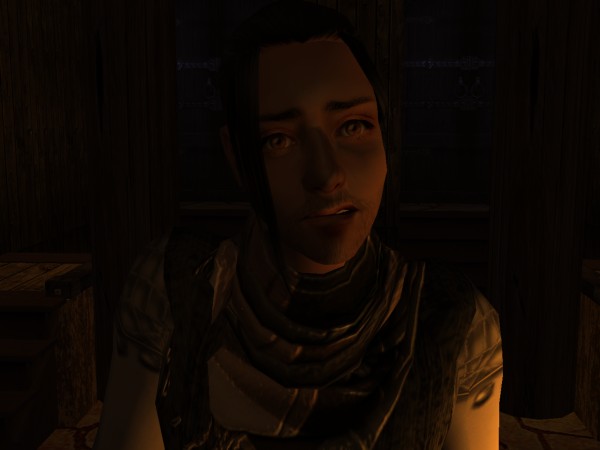
Aed looked up at her and asked her lightly, “And if Sadb will not go?”
“Then Diarmait is not worthy to drink from my father’s horn,” Orlaith replied. “A man has no worse than the wife he deserves.”
“Sometimes he has better,” Aed chuckled.
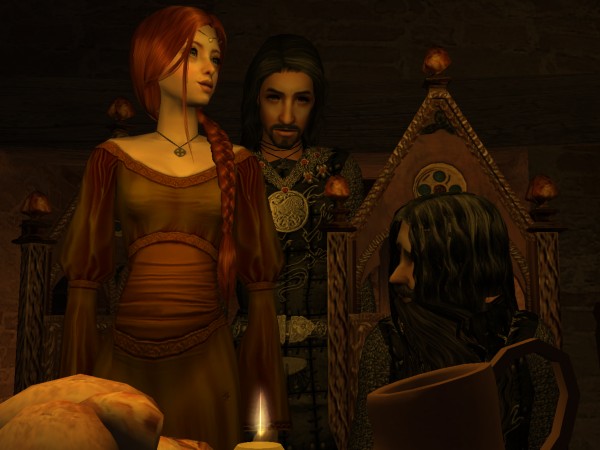
“Certainly,” Orlaith agreed as she awkwardly sought her chair in spite of her inability to see anything below her belly. “But certainly no worse.”
She thumped down onto the cushion and sighed wearily as Donnchad pushed her back to the table.
Uallach leaned past her father and whimpered, “But Mama…”
Orlaith waved the back of her jeweled hand at her daughter and muttered, “Your father will never be letting your grandfather’s horn fall into the wrong hands.”
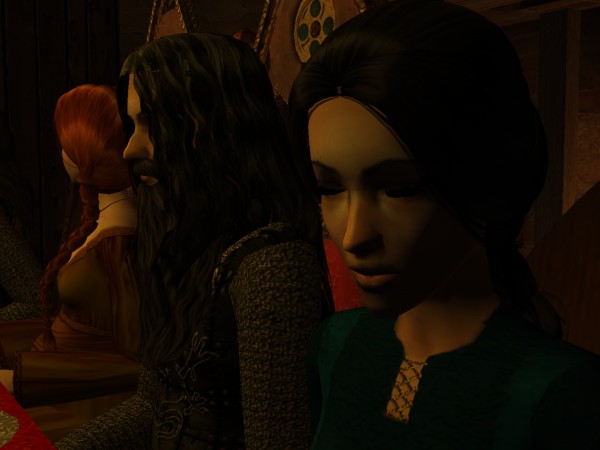
That simple. Orlaith seemed to think she had taken care of everything. Eochaid had no idea what had just been unleashed. He tried to catch Uallach’s eye, but the girl was staring mournfully at her hands, looking very much as if she wanted to hold them over her face and cry.
And while he was thus distracted, Old Aed took the opportunity to lift his arm unhindered and point at the long table to his right.
“Boy!” he said to the only boy at the table. “Take your plate and move down to make room for the lad here.”
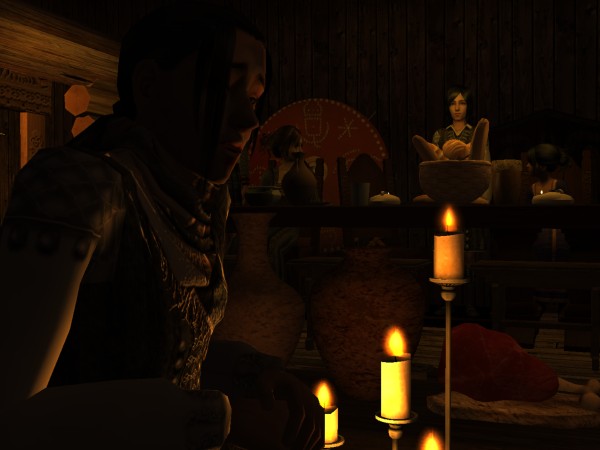
Eochaid looked around in alarm. He—a lord—the conqueror of Ramsaa—was to be seated below mac Donnchada’s sour-faced wife… below Aed’s old uncle Fingin… below and beside…
Ben Muman planted her hands on her hips and squealed, “You get to sit by me!”
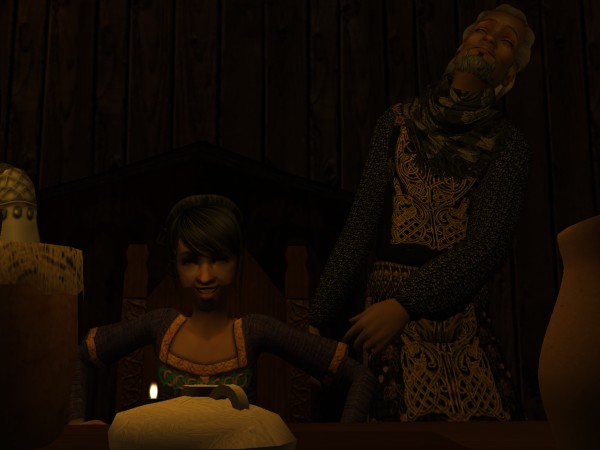





 ) But now that I've invested a Sim in her, I may use her again someday. It would be funny if she grew up to be a stunner and Eochaid tried desperately to win her someday. I don't find Uallach to be all that pretty, so I suspect Eochaid's interest in her is all about DAUGHTER OF AED! (Aed's running low on daughters, in fact, unless Orlaith has another one in her belly.)
) But now that I've invested a Sim in her, I may use her again someday. It would be funny if she grew up to be a stunner and Eochaid tried desperately to win her someday. I don't find Uallach to be all that pretty, so I suspect Eochaid's interest in her is all about DAUGHTER OF AED! (Aed's running low on daughters, in fact, unless Orlaith has another one in her belly.)



 . This means I can be a rather annoying computer user... I tend to do things by trial and error (more error than trial actually) method and sometimes that doesn't really work that well when you are trying to use a new program (or trying to make one!).
. This means I can be a rather annoying computer user... I tend to do things by trial and error (more error than trial actually) method and sometimes that doesn't really work that well when you are trying to use a new program (or trying to make one!).
Sorry no preview banner yet... I'm all out of pictures again. Real life has been really distracting lately.